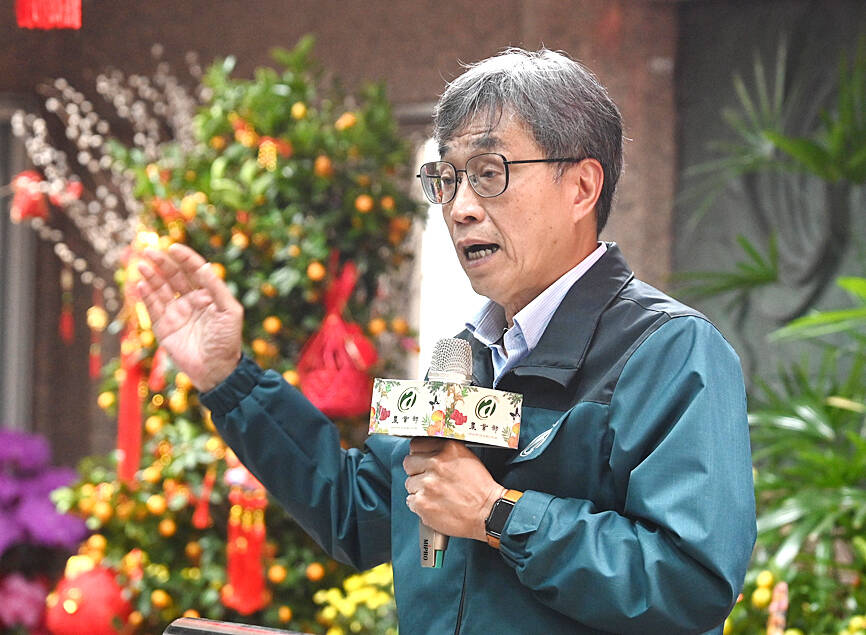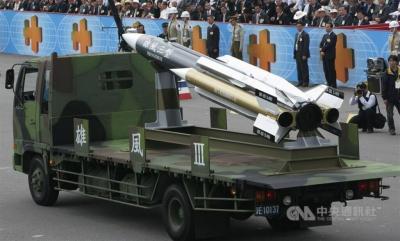Acting Minister of Agriculture Chen Junne-jih (陳駿季) yesterday said long-term observation of plant and soil ecology suggests that a subspecies of Burkholderia gladioli bacteria, which causes bongkrek acid poisoning, does not exist in Taiwan.
The Ministry of Health and Welfare on Friday evening announced that forensics testing of two deaths and blood testing of six hospitalized people, who had eaten at a Polam Kopitiam (寶林茶室) restaurant in Taipei before experiencing severe food poisoning, were found to have bongkrek acid in their blood.
Bongkrek acid is a deadly toxin produced in food, especially fermented coconut or corn, that is contaminated by one of the subspecies of Burkholderia gladioli, called Burkholderia gladioli pathovar cocovenenans (BGC), and has also been found in spoiled or fermented flour and rice-related items, as well as spoiled white or black fungus.

Photo: Wang Yi-sung, Taipei Times
As nearly all of the 28 people who fell ill after eating at the Taipei restaurant chain between March 19 and Sunday last week had eaten stir-fried flat rice noodles, many people are concerned that there might be a risk of bongkrek acid poisoning from eating locally produced rice.
Chen yesterday said that he had asked specialists at the Taiwan Agricultural Research Institute to check if the bacteria have been found in soil in Taiwan, and they told him that Burkholderia gladioli bacteria have four subspecies, and only the BGC subspecies produces bongkrek acid.
They also told him long-term observation of plant and soil ecology in Taiwan suggests that while the other three subspecies have been detected, the BGC subspecies does not exist in Taiwan, he said.
Chen said the domestic agricultural ecological chain has not been contaminated, so people should feel safe consuming locally produced agricultural products.
Regarding some local governments ordering that flat rice noodles be temporarily removed from school lunch menus, and the question of whether this would affect rice prices, Chen said the ministry would monitor the situation, adding that he respects the local governments’ decisions as some flat rice noodle products include imported corn starch.
Separately, the ministry’s Agriculture and Food Agency on Friday said people should not be overconcerned about eating rice. The Chinese term for “bongkrek acid” (米酵菌酸) — literally meaning “fermented rice bacterial acid” — could easily cause a misunderstanding.
About 1.4 million tonnes of rice is produced in Taiwan each year, which is mostly milled into white rice or brown rice, then packaged for sale, but fermentation is not part of the manufacturing process, the agency said, adding that most of the rice is sold within six months of harvesting, so there is no risk of contamination.
It advised people to choose traceable packaged rice that has the Certified Agricultural Standard label, and also buy flat rice noodles or other rice products that have higher rice content, mixed with fewer other ingredients to reduce the risk of contamination.

STATS: Taiwan’s average life expectancy of 80.77 years was lower than that of Japan, Singapore and South Korea, but higher than in China, Malaysia and Indonesia Taiwan’s average life expectancy last year increased to 80.77 years, but was still not back to its pre-COVID-19 pandemic peak of 81.32 years in 2020, the Ministry of the Interior said yesterday. The average life expectancy last year increased the 0.54 years from 2023, the ministry said in a statement. For men and women, the average life expectancy last year was 77.42 years and 84.30 years respectively, up 0.48 years and 0.56 years from the previous year. Taiwan’s average life expectancy peaked at 81.32 years in 2020, as the nation was relatively unaffected by the pandemic that year. The metric

Taiwan High Speed Rail Corp. (THSRC) plans to ease strained capacity during peak hours by introducing new fare rules restricting passengers traveling without reserved seats in 2026, company Chairman Shih Che (史哲) said Wednesday. THSRC needs to tackle its capacity issue because there have been several occasions where passengers holding tickets with reserved seats did not make it onto their train in stations packed with individuals traveling without a reserved seat, Shih told reporters in a joint interview in Taipei. Non-reserved seats allow travelers maximum flexibility, but it has led to issues relating to quality of service and safety concerns, especially during

A magnitude 5.1 earthquake struck Chiayi County at 4:37pm today, the Central Weather Administration (CWA) said. The hypocenter was 36.3km southeast of Chiayi County Hall at a depth of 10.4km, CWA data showed. There were no immediate reports of damage resulting from the quake. The intensity of the quake, which gauges the actual effect of a seismic event, measured 4 in Chiayi County, Tainan and Kaohsiung on Taiwan's seven-tier intensity scale, the data showed. The quake had an intensity of 3 in Chiayi City and Yunlin County, while it was measured as 2 in Pingtung, Taitung, Hualien, Changhua, Nantou and Penghu counties, the data

The Supreme Court today rejected an appeal filed by former Air Force officer Shih Chun-cheng (史濬程), convicted of Chinese Communist Party (CCP) espionage, finalizing his sentence at two years and two months for contravening the National Security Act (國家安全法). His other ruling, a ten-month sentence for an additional contravention, was meanwhile overturned and sent to the Taichung branch of the High Court for retrial, the Supreme Court said today. Prosecutors have been notified as Shih is considered a flight risk. Shih was recruited by Chinese Communist Party (CCP) intelligence officials after his retirement in 2008 and appointed as a supervisor